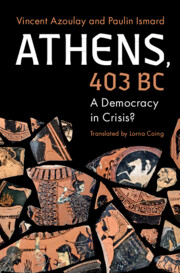Acknowledgments
This book is the result of a joyful and friendly collaborative project, spread out over more than six years. As in an ancient chorus, it is sometimes difficult to distinguish the two voices that run through it: The introduction and conclusion were conceived of, thought out and written together, and, while each chapter has an identifiable father, they would sound quite different without the intense discussions that fueled them. We hope that the two resulting half-choruses are not too discordant: on one side, Critias, Archinus, Socrates, Lysimache and Lysias; on the other side, Thrasybulus, Eutherus, Hegeso, Gerys and Nicomachus.
We would like to express our deepest gratitude to our editor, colleague and friend, Renaud Gagné. We are also indebted to the person who revised our own translation, Lorna Loing. Last but not least, we want to address our warmest thanks to Claire Taylor, who agreed to proofread the entire manuscript in order to remove, as far as possible, the errors and omissions left, and who polished the expression. It was a real chance to benefit from her eagle (yet benevolent) eye. It’s also a pleasure to thank Robin Osborne for his generous preface.
Throughout this adventure, several choruses of friends and colleagues gave us their advice and suggestions. They helped our desire to work together, a notion we dreamt up at a research laboratory – one used by the ANHIMA research centre (Anthropologie and Histoire des Mondes Anciens) – to culminate in a real book.
We would especially like to thank our great mutual friend, Yann Potin, who worked with us on this project from the very outset, as well as Sophie Berlin, who enthusiastically welcomed the choral intuition behind it. Their unfailing support accompanied the progressive transformations of the book until it found its final form.
We are grateful to many colleagues and friends for the exchanges we have had during several colloquia, seminars and editorial committees. It is a great pleasure to be able to thank Etienne Anheim, Patrick Boucheron, Mirko Canevaro, Françoise Frontisi, Adeline Grand-Clément, Thomas Hirsch, Pierre Judet de La Combe, François Lissarrague, Arnaud Macé, Claudia Moatti, Pascal Montlahuc, Christel Muller, Violaine Sébillotte and Anne Simonin. Some of them have even kindly reread entire chapters: Pierre Chiron agreed to put his rhetorical expertise at the service of the chorus of Lysias; and Anton Powell, a formidable scholar and tireless editor, lent his ear to the chorus of Critias to correct any off-key notes. He is in our thoughts, as he has recently been snatched from us by illness.
The writing of our book took shape during the seminar ‘Les figures du politique’ at the École des Hautes Études en Sciences Sociales. The chorus that agreed to discuss, week after week, the hypotheses put forward played an essential role in helping our thoughts mature. Our special thanks go to Alexandra Bartzoka, Louise Bruit, Antoine Chabod, Hugo Chausserie-Laprée, Panos Christodoulou, Paul Cournarie, Mathilde Defosse, Charles Delattre, Jocelyn Deseau, Marie Durnerin, Daniele Guasco, Sophie Lalanne, Françoise Legrand, Pierrine Malette, Daria Russo, Nicolas Siron, Alexandre Vlamos and Adrien Zirah.
Finally, this book is a continuation of our previous work on democracy, and we must thank those who, long ago, showed us the new paths of Athenian politics and suggested the relevance of a choral approach: Pauline Schmitt, Claude Calame and, of course, Nicole Loraux, whose intimidating shadow was by our side throughout this adventure.
